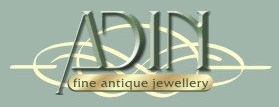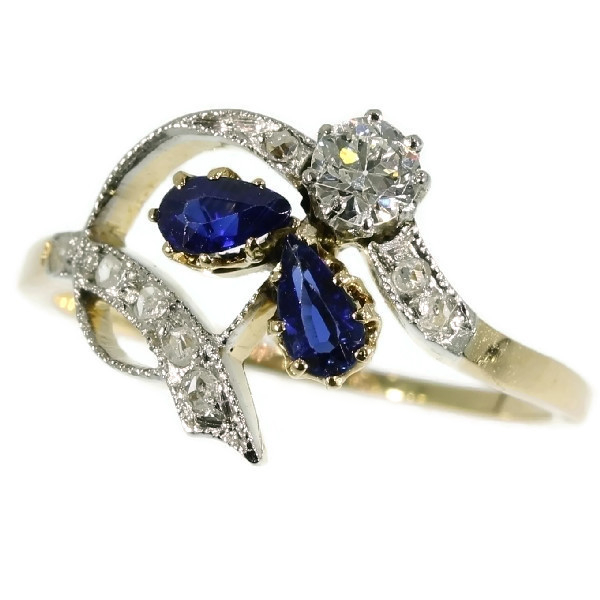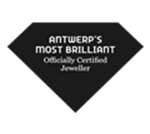We offer layaway, spread payments on the piece of your dreams. Ask us for details. Free insured shipping on all orders !!!
Belle Epoque diamond and sapphire engagement ring
Antique jewelry object group: engagement ring (or anniversary ring)
Condition: excellent condition
- (more info on our condition scale)
Country of origin:
France
Style:
Belle Époque - The Belle Époque (French for "Beautiful Era") was a period in European social history that began during the late 19th century and lasted until World War I. Occurring during the time of the French Third Republic and the
German Empire, the "Belle Époque" was named in retrospect, when it began to be considered a "golden age" the major powers of Europe, new technologies improved lives and the commercial arts adapted Renaissance and eighteenth-century styles to
modern forms. In the newly rich United States, emerging from the Panic of 1873, the comparable epoch was dubbed the Gilded Age. In the United Kingdom, this epoch overlaps the end of what is called the Victorian Era there and the period named the
Edwardian Era.
or more info on styles
Style specifics:
The Belle Époque (French for "Beautiful Era") was a period in European social history that began during the late 19th century from the Franco-Prussian War (1870-1871) and lasted until World War I (1914-18).
Occurring during the time of the French Third Republic and the German Empire, the "Belle Époque" was named in retrospect, when it began to be considered a "golden age" the major powers of Europe, new technologies improved lives and the commercial
arts adapted Renaissance and eighteenth-century styles to modern forms.
In the newly rich United States, emerging from the Panic of 1873, the comparable epoch was dubbed the Gilded Age. In the United Kingdom, this epoch overlaps the end of what is called the Victorian Era there and the period named the Edwardian Era.
In the Belle Époque cheap coal and cheap labour contributed to the cult of the orchid and made possible the perfection of fruits grown under glass, as the apparatus of state dinners extended to the upper classes; champagne was perfected during the
Belle Époque. Exotic feathers and furs were more prominently featured in fashion than ever before, as haute couture was invented in Paris, the centre of the Belle Époque, where fashion began to move in a yearly cycle; in Paris restaurants
such as Maxim's achieved a new splendour and cachet as places for the rich to parade, and the Opéra Garnier devoted enormous spaces to staircases as similar show places.
After mid-century, railways linked all the major cities of Europe to spa towns like Biarritz and Deauville; their carriages were rigorously divided into first-class and second-class, but the super-rich now began to commission private railway coaches, as
exclusivity was a hallmark of opulent luxury. Bohemian lifestyles gained a different glamour, pursued in the cabarets of Montmartre.
Period: ca. 1900
- (events & facts of this era, poetry of this era,
fashion of this era)
Material: Two tones of precious metal, the main part being 18K yellow gold
and the white parts are either white gold or platinum.
- (more info on precious metals)
Extra information:
engagement ring
- Especially in Western cultures, an engagement ring is a ring indicating the that the person wearing it is engaged to be married. In the United Kingdom, and North America, engagement rings are traditionally worn only by women, and rings can feature
gemstones. In other cultures men and women usually wear matching rings, which can be plain. In some cultures, engagement rings are also used as wedding rings.
Conventionally, the woman's ring is presented as a betrothal gift by a man to his prospective spouse while he proposes marriage or directly after she accepts his marriage proposal. It represents a formal agreement to future marriage. Rings can be bought
by the man, the couple together, or by each partner for the other.
In North America and the United Kingdom, it is worn on the left hand ring finger, while in Poland and Ukraine, it is customary for the ring to be worn on the right hand. In Germany, the ring is worn on the left hand while engaged, but moved to the right
hand when married. Similar traditions purportedly date to classical times, dating back from an early usage reportedly referring to the fourth finger of the left hand as containing the vena amoris or "vein of love".
Betrothal rings were used during Roman times, but weren't generally revived in the Western world until the 13th century. The first well-documented use of a diamond ring to signify engagement was by the Archduke Maximilian of Austria in imperial court of
Vienna in 1477, upon his betrothal to Mary of Burgundy.
In the 20th century, if he could afford it, the typical Western groom privately selected and purchased an engagement ring, which he then presented to his desired bride when he proposed marriage. More recently, couples frequently select an engagement ring
together. (from Wikipedia)
Diamonds:
One old European cut
diamond with an estimated weight of approx. 0.17 crt. (approximate color and clarity: G/H, si)
and eight rose cut diamonds
and senailles
. A senaille is a simplified rose cut diamond, a small diamond chip with perhaps a few polished facets. We do not have the weight of the rose cuts diamonds nor the senailles which is normal in our trade when it comes to rose cut diamonds and senailles.
Note: All diamond weights, color grades and clarity are approximate since the stones were not removed from their mounts to preserve the integrity of the setting.
Total diamond weight: approx. 0.17 crt.
(without the rose cut diamonds)
Precious stones:
Two pear shaped sapphires (lab produced) (also called
verneuil
sapphire). The fact that these stones are lab produced has no influence on the value of this jewel. Natural rubies
and lab produced sapphires were both used in this era, rather more for their effect than for their intrinsic value.
- (more info on precious stones)
Birthstones:
Diamond is the birthstone (or month stone) for April
and sapphire for September.
- (more info on birthstones)
Hallmarks: The French control mark for 18K gold representing an eagle's head
that was in use in France from about 1838.
- (more info on hallmarks)
Weight: 2,50 gram (1,61 dwt)
Ring size Continental: 53 & 17 , Size US 6¼ , Size UK: M
Resizing: Free resizing, but because of the the way the ring is made, we cannot guarantee to make it on every size; so please ask in advance (only for extreme resizing we have to charge).
- (more info on ring sizes)
Reference Nº: 15177-0003
Copyright photography: Adin, fine antique jewelry
bi-color jewelry,
jewelry with diamond,
jewelry with rose cut diamonds,
jewelry with sapphire,
latest acquisitions,
antique jewelry,
estate jewelry,
vintage jewelry or
modern jewelry
Jewelry with birthstones (or month stones) for:
January -
February -
March -
April -
May -
June -
July
August -
September -
October -
November or
December.
Additional information:
jewelry glossary -
wall of fame -
visit us in Antwerp -
subscribe to our mailinglist.
What is antique jewelry? -
What is estate jewelry? -
What is vintage jewelry?




